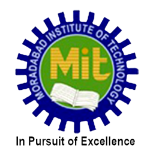
Department of Electronics & Communication Engineering
Program Educational Objectives
PEO 1: Applying Electronics and Communication Engineering knowledge based on a solid foundation in Communication Engineering areas for the needs of the market and Industry.
PEO 2: Upholding the importance of professionalism and ethics in Electronics Engineering profession to form a cultured and more developed society.
PEO 3: Possessing communication and interpersonal skills, to meet the Institute’s and nation’s aspiration.
PEO 4: Developing skills in research in Electronics Engineering particularly in the areas of Communication Engineering to generate new knowledge to
satisfy the needs of the complex technological needs for the economic development of the country.
Program Outcomes
- Engineering knowledge: Apply the knowledge of mathematics, science, engineering fundamentals, and an engineering specialization for the solution of complex engineering problems.
- Problem analysis: Identify, formulate, research literature, and analyze complex engineering problems reaching substantiated conclusions using first principles of mathematics, natural sciences, and engineering sciences.
- Design/development of solutions: Design solutions for complex engineering problems and design system components or processes that meet the specified needs with appropriate consideration for public health and safety, and cultural, societal, and environmental considerations.
- Conduct investigations of complex problems: Use research based knowledge and research methods including design of experiments, analysis and interpretation of data, and synthesis of information to provide valid conclusions.
- Modern tool usage: Create, select, and apply appropriate techniques, resources, and modern engineering and IT tools, including prediction and modeling to complex engineering activities, with an understanding of the limitations.
- The engineer and society: Apply reasoning informed by the contextual knowledge to assess societal, health, safety, legal and cultural issues and the consequent responsibilities relevant to the professional engineering practice.
- Environment and sustainability: Understand the impact of the professional engineering solutions in societal and environmental contexts, and demonstrate the knowledge of, and need for sustainable development.
- Ethics: Apply ethical principles and commit to professional ethics and responsibilities and norms of the engineering practice.
- Individual and team work: Function effectively as an individual, and as a member or leader in diverse teams, and in multidisciplinary settings.
- Communication: Communicate effectively on complex engineering activities with the engineering community and with the society at large, such as, being able to comprehend and write effective reports and design documentation, make effective presentations, and give and receive clear instructions.
- Project management and finance: Demonstrate knowledge and understanding of the engineering and management principles and apply these to one’s own work, as a member and leader in a team, to manage projects and in multidisciplinary environments.
- Life-long learning: Recognize the need for, and have the preparation and ability to engage in independent and life-long learning in the broadest context of technological change.
Program Specific Outcomes
After completing their graduation, students of Electronics and Communication Engineering will be able to –
PSO1: Comprehend the core subjects of Electronics and Communication Engineering and apply them to resolve domain specific tribulations.
PSO2: Apply technical, software and hardware knowledge acquired during the course to solve real-time problems related to Electronics and Communication Engineering.

